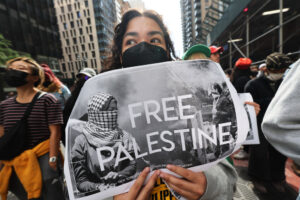One of the greatest challenges human beings face is how to tease apart a bad act from a good character — or, conversely, a toxic personality from the good and worthy things he created. How do we separate the long-time childhood friend from his insane Facebook polemics? The good neighbour from his bad politics?
“People are thoughtless all the time,” writes Alexandra Hudson in her new book, The Soul of Civility, while arguing that the best way to depolarise our society is to recognise that good people can have bad ideas. This idea is classically Christian, but also fundamentally American: even after the Civil War, a central tenet of Reconstruction was that those who fought for the Confederacy should be given grace for having chosen the wrong side. But that’s a principle it’s easier to hold to in the wake of victory than in the fog of war — or, as this past week’s events have reminded us, War Discourse.
The response from certain corners of the progressive Left to the stories coming out of Israel has been extraordinary. The silhouette of a paragliding Hamas militant has been adopted by groups ranging from Black Lives Matter to the Democratic Socialists of America — a graphic successor to that Che Guevara block print that used to hang on every dorm room wall. A crowd on the steps of the Sydney Opera House in Australia chanted “gas the Jews”. A cheer went up in Times Square at the news that 700 Israelis had been killed. And among the academic and media classes, a series of statements ran the gamut from half-hearted condemnations of the terrorist attacks to triumphant and bloodthirsty snarling.
“What did y’all think decolonization meant? vibes? papers? essays? losers,” wrote Najma Sharif, a writer for Soho House magazine and Teen Vogue. “Today should be a day of celebration for supporters of democracy and human rights worldwide,” tweeted Rivkah Brown of Novara Media. The language varied, but the sentiment was the same: this is good, actually, and seeing it should fill you with the same cathartic glee as any underdog story. Don’t you see? This isn’t terrorism; it is justice.
Who has time to care about civility when the world is burning down? Three nights ago, I was part of an audience on East 46th Street listening to Hudson explain the relationship between civility and “the norms of the practice of war” — norms which, of course, Hamas has explicitly chosen to subvert in its targeting and killing of civilians. The next day, on the phone, I asked her what civility looks like in an age of extreme polarisation.
“Human nature hasn’t changed,” she said. (Her references include many ancient texts.) “But the ubiquity of our interconnectedness… that is different, that is new, and it presents new challenges to civility. It can coarsen us and desensitise us to the suffering of others when we’re imbibing it all the time.”
The war in Israel, and the one in Ukraine: it’s not hard to see how our distance from these events, combined with the immediacy of so much coverage and conversation about them, lends itself to the most grotesque kind of rubbernecking. It’s war as spectator sport; people haggle over the reports of Hamas beheading babies with the same energy as a group of armchair referees debating an off-side call.
Some people, anyway. The term “luxury beliefs” was coined to describe how privileged progressives like to traffic in this sort of unhinged extremist rhetoric. Partly, it’s a hazard of their utter insulation from ever having to experience the practical impact of the policies they advocate. Violence and chaos have a way of breaking through the barriers that separate the ivory tower-dwellers from the masses they condescend; one imagines the occupants of Versailles looked out their windows at the guillotine being constructed in the public square and, not understanding what lay in store, pronouncing the structure adorable.
But it’s also what happens when you succumb to the Manichean worldview that every conflict, every issue, boils down to a simple question of who is the more oppressed party. Whichever guy has more privilege, more power: this is your villain. In trying to topple him from his unearned position of influence, his victim can do no wrong. Hamas, composed as it is of Muslim people of colour, is merely punching (and raping, and kidnapping) up.
While the attacks on Israel have given rise to a particularly stomach-turning iteration of this rhetoric, we have seen it before. In 2020, as the US protests against police violence spiralled out of control, members of the laptop class could reliably be found posting that Martin Luther King Jr quote about riots being “the voice of the unheard” — always from the safety of their homes, in nice neighbourhoods, in coastal cities, where things were conspicuously not on fire. The people looting, rioting, and wreaking havoc were members of an oppressed class, and hence above reproach.
But the most absurd example of how true-life horrors become grist for the mill of perverse progressive fantasy popped up downstream of the “decolonisation” discourse. Every now and then, someone announces on the internet that they would begrudgingly allow themselves to be murdered if Native Americans decided to violently re-exert ownership over their ancestral lands. The authenticity of such sentiments is obviously belied by the fact that these same people could, if they wanted to, voluntarily renounce their power instead of waiting for some noble savage to take it by force. If you truly believed yourself to be a colonist, illegitimately squatting on someone else’s property, why would you waste time tweeting about it? Wouldn’t you just leave?
But surely it’s hardly worth pointing this out. The offensiveness of such a line of speculation is exceeded only by its impossibility; we could just leave its proponents alone to play in their ghoulish little sandbox, with their terrible little toys. And yet this, too, would be uncivil.
“Civility doesn’t require forgetting, it doesn’t require sweeping grievances under the rug,” says Hudson. “It requires confronting people with their mistakes, misjudgements, misdeeds. To do anything else is to see them as a child, as lesser.”
If civility demands that we hold people to account for the hatred they spew, it also rejects the notion that a person of an “oppressed” identity category should get a free pass to spew hatred. The bar for human decency, surely, does not shift depending on the colour of your skin or the arrangement of your genitals — and to insist on this, on one standard for all people, creates a clear path forward, which may be the best thing about civility as an ethos. It works on the assumption that, as bleak as things are now, there will be an “after” in which we forgive, even if we don’t forget.
A day after her “celebration” post, Rivkah Brown deleted it, and wrote the following: “I responded too quickly and in a moment of heightened emotion. Witnessing Palestinians defy decades of oppression hardened me to the suffering of Israeli civilians, including my friends and family, and I regret that. I’m sorry.”
Of course the human instinct, as demonstrated in the replies to her post, is to not accept the apology. The hazard of finding oneself on the moral high ground is that it becomes difficult not to revel in being up there, and not to kick at least a little dirt down onto the person grovelling below you. “Self-sacrifice is not our natural way of thinking or taking action,” Hudson writes in The Soul of Civility. “The Book of Proverbs from the Hebrew Bible goes so far as to charge us to ‘bind [these teachings] around our neck,’ as we are prone to forget them.”
As I left Hudson’s event on Tuesday night, I found the street closed off. Instead of cars, the pavement was occupied by hundreds of people holding signs and banners and flags: the remnants of what had been a massive rally in support of Israel. I would later learn that some people present were captured on camera wishing for the annihilation of Palestine; no one side, as it turns out, has a monopoly on hatred.
As I weaved through the crowd, Leonard Cohen’s “You Want it Darker” was playing through my headphones, a fitting meditation on war, death, and the cruelty we inflict on each other in the name of a just cause.
They’re lining up the prisoners
And the guards are taking aim
I struggle with some demons
They were middle-class and tame
I didn’t know I had permission
To murder and to maim
The chorus to this song is a Hebrew word, a line from the Torah. It’s what Abraham says, in response to God’s request that he sacrifice his son; it is also what we might say to each other, eventually, when civility or decency or whatever deity you believe in asks us to confront and forgive each other’s failings in this moment, the better to thrive in the moments we have left.
Hineni, hineni. I’m ready, I’m ready.
Disclaimer
Some of the posts we share are controversial and we do not necessarily agree with them in the whole extend. Sometimes we agree with the content or part of it but we do not agree with the narration or language. Nevertheless we find them somehow interesting, valuable and/or informative or we share them, because we strongly believe in freedom of speech, free press and journalism. We strongly encourage you to have a critical approach to all the content, do your own research and analysis to build your own opinion.
We would be glad to have your feedback.
Source: UnHerd Read the original article here: https://unherd.com/



